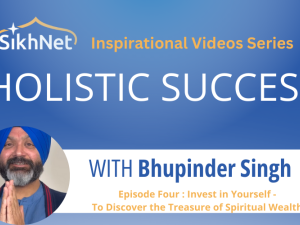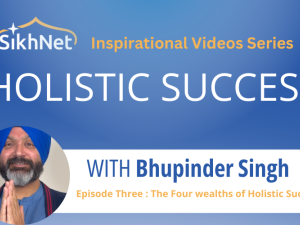The pinnacle of Guru Nanak's Marg is Gyan Marg, whereby there is change in understanding without a change in the outer world in terms of the physicality of things, profession or attire. When a person transcends from Bhagti Marg to Gyan Marg, an inner revolution happens that reflects in Sansakars, voice, demeanor and actions. A Bhagat sees himself/herself and then the Paramatma. A Bhagat will see himself and Paramatma as separate. As the Bhagat evolves he/she treads upon Gian Marg, that is rooted in Ik Onkar, meaning there is only one.
The one is described in mool mantra. If it is one, and other than that, that is all prevailing, manifested and non-manifested one, there is none, that means "I" does not exist. If "I" exists it is Haume. When Haume ceases to exist like a lump of salt thrown into water it dissolves, only water remains. When Haume dissolves in Gyan, only Gyan, Ik Onkar remains. Bhagat, and all of Bhagat's Gyan does not remain either.
If there is no I, there is nothing that is mine, not even the memorized Bani and beautiful understanding of it. There is dissolution of memory (Karma) and thoughts do not arise from past, instead thoughts come from the source, thus there is Nihkarm, Mukti. Check where you are on your journey of understanding. Bani will start making alot more sense, the difference in expressions in Bani will start fading away as you will start seeing the world through Ik Onkar, instead of Many (memory).
All differences, conflicts, mine and yours are when we see through Mann (memory) which shows separation in form of duality - Sukh/Dukh, Swarg/Narak, Chnga/Mada and so on. Dharm (religion) is a personal matter, a personal choice and personal evolution of understanding. Not sure what one shall call the masses getting together and going against each other. Definitely not the Dharma that brings about transformation in understanding whereby Ki Onkar remains.





